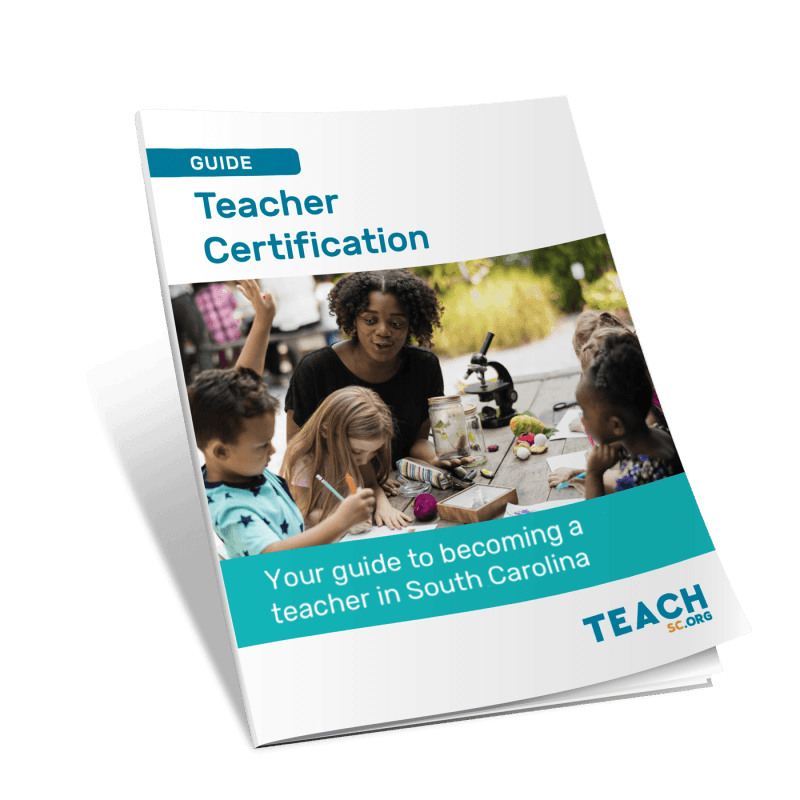To teach in South Carolina, you’ll need a bachelor’s degree and a teaching certificate. At least, that’s the short version.
On this page, we’ll go over the steps to get certified to teach in South Carolina, plus answer some commonly asked questions about certification. Let’s dive in!
Steps to a Teaching Certificate
- 1
Decide what you want to teach
When you enroll in a teaching program, you'll need to know the subject and grade level you want to teach. These will determine your teaching certificate field.
Getting certified in a shortage area can provide more opportunities and even higher pay!
- 2
Apply to teaching programs and enroll
South Carolina accepts degrees from a large number of universities, but you should confirm that yours is regionally accredited. Make sure to look for programs that offer the certification subject area you want!
If you don't have a bachelor's degree, many programs combine teacher certification with undergraduate coursework, so you can get certified and earn a degree at the same time.
If you already have a bachelor's, you'll look for master's degree + certification, certification-only or alternative certification programs. (1)
TeachSC can help you save money on teaching program applications! We’ll reimburse up to $100 for any expenses required for you to apply to a teaching program (like application fees, transcript fees and more). Get $100 back.
- 3
Meet South Carolina teacher testing requirements.
You’ll have to take a few tests to show you’re ready to lead your own classroom. These include a subject matter exam and a teaching portfolio.
You’ll have to pass one or more tests designed to show you know your subject well enough to teach it. Depending on your teaching program, you might take a test before you enroll, during your program or after you finish.
Not sure where to start with test prep? We've got tools for that! The TeachSC Testing Guide and Praxis Subject Test Guide cover everything from registration to study materials to what to expect on test day.
- 4
Submit your teaching certificate application to the state.
Almost there! Confirm with your teaching program that you are eligible to apply for your teaching certificate from the state. After that, contact the South Carolina Department of Education with any questions.
Get the Certification Guide

The TeachSC Certification Guide has everything you need to start your journey. Get details about teaching programs, certification fields and steps to a teaching certificate, all in one place!
It’s all free.
Frequently Asked Questions
What’s next
SC Program Explorer
Ready to explore teaching programs? Find the right fit with our Program Explorer! Filter by degree, online options, tuition costs and more.
Explore ProgramsCareer Coaching in South Carolina
Talk to an expert about how to become a certified teacher in South Carolina. Get free advice on what to teach and how to choose and apply to the right program.
Read MoreAlternative Teacher Certification in South Carolina
If you have a bachelor’s degree, you may be able to start teaching right away. Learn how TeachSC can help you get started.
Read MoreReferences
- Guidance for Prospective Educators. South Carolina Department of Education. https://ed.sc.gov/educators/teaching-in-south-carolina/pathways/
- “Teacher Pay and Student Spending: How Does Your State Rank?” National Education Association. April 29, 2025. https://www.nea.org/resource-library/teacher-pay-and-student-spending-how-does-your-state-rank
- National Board Certification. South Carolina Board of Education. https://ed.sc.gov/finance/financial-services/national-board-certification
Sign Up for Free Resources
Enter your email to get FREE resources for future South Carolina teachers—from tailored advising to funding opportunities and more. Already signed up? Sign in at the top of the page to access your dashboard.
